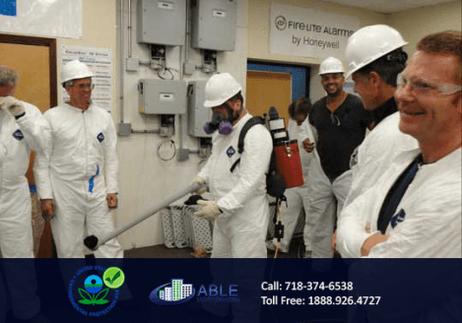A new law regarding the renovation of buildings that contain lead paint will go into effect in April 2010, and it has contractors and other professionals scrambling to earn the certification that will be mandated by law. Thankfully, some community colleges offer courses to help with the certification process.
Starting in April 2010, federal law will require all professionals hired to renovate, repair, or paint homes, childcare facilities, or schools built before 1978 to be certified in lead-safe work practices. The change is mandated by the Environmental Protection Agency's (EPA's) new Lead Renovation, Repair and Painting (RRP) Rule. The EPA's new rule requires that accredited centers train renovators in lead-safe work practices, and renovators and renovation firms must be certified as capable of working safely with lead-based paint.
The new law is designed to improve public health and safety, as working with lead paint can result in lead dust and chips being disseminated in the air, harming the health of children and adults. According to a New York Fox News station report, 14% of the children in New York State who had elevated levels of lead in their blood suffered from the condition as a direct result of home renovation projects.
Training for Lead-Safe Workers
Contractors and other professionals who work with paint in buildings built before 1978 must show that they have taken a training course and received a certificate in lead-safe working practices. The EPA provides a list of accredited training providers on its website. Community colleges that are accredited training providers in the soon-to-be-required certification include:
- Delaware Technical and Community College
- Nevada's Truckee Meadows Community College
- New Mexico's Santa Fe Community College
- South Carolina's Greenville Technical College
- Pitt Community College
Working Safely with Lead
On its website, the EPA lists three basic rules that must guide all workers who come across lead paint:
- Contain the area
- Minimize dust
- Clean up the work site
However, because lead paint has the potential to be highly toxic, verbal reminders such as these are not enough. That's why the EPA requires professionals who come across lead paint to receive the new certificate, demonstrating they have received hands-on instruction in safe practices for working with lead-based paint.
What the Training Will Involve
A Daily Reflector article on Pitt Community College's newly accredited training program on working safely with lead-based paint reports that courses in the certificate sequence will explain:
- Why lead-based paint can be dangerous during renovations
- How to determine the extent of the hazard posed by lead-based paint in particular work environments
- How to properly set up a work environment so the lead dust and chips can be contained
- How to properly clean up after a job that involved lead-based paint
- How to safely dispose of waste after a job involving lead-based paint
- How to document that lead-safe work procedures have been followed
Importance of the New Lead-Safe Certification
Lead-based paint poses serious health risks, especially to children and pregnant women. The Environmental Protection Agency reports that children with high levels of lead in their blood can suffer from:
- Behavior and learning problems, such as hyperactivity
- Slowed growth
- Headaches
- Hearing problems
- Neurological damage
Adults can also be harmed by lead-based paint; exposure to lead in adults can lead to infertility, memory and concentration problems, muscle and joint pain, nerve disorders, high blood pressure, and hypertension.
People can inadvertently ingest lead in a variety of ways, according to the EPA. Children often accidentally ingest lead by putting paint chips or soil containing lead in their mouths. Children and adults can also ingest lead if they put objects (such as forks) in their mouths after the objects have been covered with lead dust during a renovation.
Finally, children and adults can suffer lead poisoning simply from breathing excessive lead dust created while renovating an area containing lead-based paint. For this reason, the EPA has created its new Renovation, Repair, and Painting Rule.
Although the number of community colleges that are accredited training centers for the new renovation, repair, and painting certificate is relatively small at present, as the date in which the new law goes into effect approaches, more community colleges will likely begin offering training programs for workers looking to become certified in the newly mandated lead-safe practices.
If you're a contractor or other professional whose work often puts you in the path of lead-based paint, keep your eye out for such a lead-safe certificate program at a community college near you.
Questions? Contact us on Facebook. @communitycollegereview












